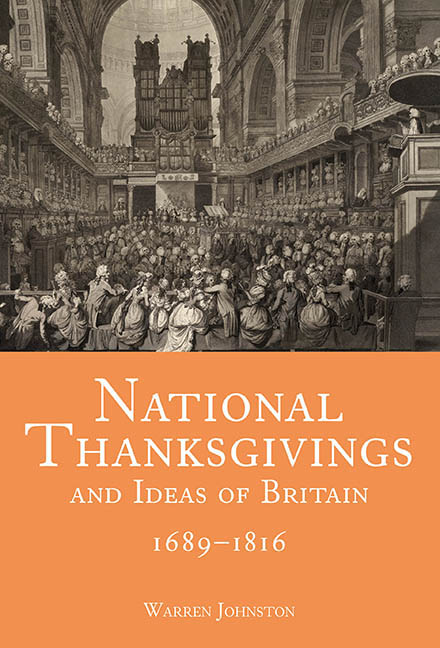Book contents
- Frontmatter
- Dedication
- Contents
- Acknowledgements
- Notes on elements of the text
- List of general thanksgiving days 1689–1816
- Introduction
- 1 Sermons and thanksgiving-day sermons in the long eighteenth century
- 2 Thanksgiving-day sermons – purposes and meanings
- 3 ‘The Palladium of our Safety’ – Providence and Britain
- 4 Political theory and principles
- 5 ‘This Carping Age’ – the politics of unity and discord
- 6 War
- 7 Costs of war and consequences of peace
- 8 Commerce and Empire
- 9 Anglicanism, dissent, anti-Catholicism, and infidelity
- 10 Others and Britons
- Conclusion
- Appendix A Thanksgiving-day preachers’ and sermon details
- Appendix B Denominational breakdown of thanksgiving-day preachers
- Appendix C Main scriptural texts used for thanksgiving-day sermons
- Bibliography of primary sources
- Bibliography of secondary sources
- Index
1 - Sermons and thanksgiving-day sermons in the long eighteenth century
Published online by Cambridge University Press: 02 May 2020
- Frontmatter
- Dedication
- Contents
- Acknowledgements
- Notes on elements of the text
- List of general thanksgiving days 1689–1816
- Introduction
- 1 Sermons and thanksgiving-day sermons in the long eighteenth century
- 2 Thanksgiving-day sermons – purposes and meanings
- 3 ‘The Palladium of our Safety’ – Providence and Britain
- 4 Political theory and principles
- 5 ‘This Carping Age’ – the politics of unity and discord
- 6 War
- 7 Costs of war and consequences of peace
- 8 Commerce and Empire
- 9 Anglicanism, dissent, anti-Catholicism, and infidelity
- 10 Others and Britons
- Conclusion
- Appendix A Thanksgiving-day preachers’ and sermon details
- Appendix B Denominational breakdown of thanksgiving-day preachers
- Appendix C Main scriptural texts used for thanksgiving-day sermons
- Bibliography of primary sources
- Bibliography of secondary sources
- Index
Summary
For readers in the early twenty-first century, it can be difficult to understand the importance of sermons in early modern British society. The impediment is not simply due to the decline in the presence of the church in contemporary people's everyday lives, but also the fact that sermons are viewed often with trepidation (at best) or derision. For those who regularly attend church services, sermons are perhaps seen as necessary moral and theological guidance, or instigation to social awareness. But even these aspects can now be found more readily in other places and through other media. Even historians of English religion at times do not provide much encouragement to seek out sermons from the early modern period: in his seminal study of the public sermons given in London at Paul's Cross, Millar MacLure described the sermon literature from the beginning of the English Reformation to the eve of the Civil Wars as including ‘a great maze of repetitious bad rhetoric… singularly dull humourless pedestrian thought and expression’. More recently, Patrick Collinson, the late prominent historian of the Elizabethan and Jacobean churches, called seventeenth-century fast sermons and jeremiads ‘theologically limited, intellectually impoverished, and almost unbearably repetitious’. Stark judgements like these from historians who used hundreds of early modern sermons in their work make it more difficult to argue the case for the study of sermons as beneficial and significant.
The context of the ‘Information Age’ also makes it challenging to recognise the role sermons played in early modern society. As James Downey has observed, modern scholars’ disregard of sermons ‘arises from the failure to appreciate the importance that sermons once had in secular as well as religious life. In an age of mass media, compulsory education, … [and] highly-specialised entertainments… many former functions of the pulpit have been taken over by other agencies.’ Though it may seem trite, it bears remembering that the sixteenth, seventeenth, and eighteenth centuries were a time without the availability and distractions of all of the forms of information sources we take for granted today: because of this, it was the pulpit and the press that accounted for much of the spread of ideas and news that occurred then.
- Type
- Chapter
- Information
- National Thanksgivings and Ideas of Britain, 1689–1816 , pp. 11 - 30Publisher: Boydell & BrewerPrint publication year: 2020



